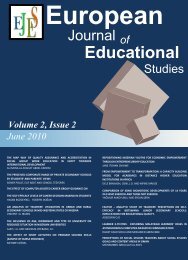Download complate issue - Ozean Publications
Download complate issue - Ozean Publications
Download complate issue - Ozean Publications
- No tags were found...
You also want an ePaper? Increase the reach of your titles
YUMPU automatically turns print PDFs into web optimized ePapers that Google loves.
pressure about giving new rights to Christian minorities over the Ottoman State. Mustafa Reshid Pasha believedthat the State could be saved if reforms could be made by taking Europe an example. That Tanzimat Edict wasproclaimed under these hard conditions and included many ideas regarded unfamiliar by the society, likedeeming Muslim and Non-Muslim citizens equal before the law until that time. Innovations made with theTanzimat became the beginning of a new term and lighted the way for reforms which will be made in the future.(Yıldız 1992: VII-IX) In the times when the Tanzimat Edict was proclaimed, the problematic situation in whichthe Ottoman State took place was wanted to be solved through interventions of European States and especiallyEngland. (Kütükoğlu 2001: 355) So the moderate medium provided with the edict facilitated to solve the Egypt<strong>issue</strong> which became a matter of Europe. The problem was solved thanks to that five States meted in London withthe suggestion of England and France being the ally of Mehmed Ali Pasha was excluded and then the LondonAgreement was signed in July 15, 1840 between England, Russia, Austria and Prussia. Therefore Mehmed AliPasha left the lands he occupied and Egypt Governorship was left to him with the inheritance method. (Küçük1999: 259)Some sovereigns and Statesmen believed that reforms in military area should be made to prevent successivemilitary failures and assumed they could be saved from these problems with the Tanzimat. (Kaynar 1991: 2)Whereas with this edict, the pressure of the West much increased primarily in the subject of situations ofChristian minorities and later of the realization of administrative and judicial reforms. (Zürcher 1996: 87)The Imperial Edict, which was read in the garden of Gulhane by Mustafa Reshid Pasha on Sunday 3 November1836, was entitled the Tanzimat Edict. “In the reading of the edict, the audience consisted of the sultan, first menof the State, notables, representatives of Non-Muslim congregations, embassies of foreign countries and peoplefrom the public.” It was stated that the safety of life, goods and chastity would be given to everybody eitherMuslim or Non-Muslim, taxes would be collected righteously, an arrangement would be brought to militaryservice and the „imtiyazat (privileges)‟ declared in the edict would be complied by the sultan himself and peoplenot complying with it would be punished. (Türköne 1999: 275, Koçu 1981: 393)2. Analysis of the Tanzimat EdictThe Tanzimat Edict aimed interdependence in the society and the togetherness thought and goaled the Ottomancitizenship thought. In the first part, in respect of opinions revealed, it was stated that the State became powerfulas of the beginning was sourced from the commitment to Koran and its principles. In the second part, it wasstated that the State got weaker for laws and rules were not complied in the last a hundred and fifty year. In thethird part, it was stated that new laws were put for the State to be powerful again. In the fourth part, it was statedthat the laws to be formed newly would be applied among citizens justly and equally. In the fifth part, it was toldabout bases of new laws in principle. When we analysed the edict in this way under five parts, the mostimportant point attracting our attention was living of big changes in terms of personality rights. Therefore thesecular and democratic system became important for the Ottoman State. (Hayta 2003: 121-123) As a result ofrenovations made with the Tanzimat Edict, the basic principles accepted by European States were accepted.Therefore in the Ottoman State, democratic order will start to come into being. (Karal 1988: 173)In the Tanzimat Edict there isn‟t any lack of method with respect the way text is written. However whenexamined its provisions, there are big changes in terms of rearranging relations between citizens and the Stateand limiting authorities of the sovereign legally. So this edict provided the formation of a constitutionalmanagement. With the Imperial Edict of Gulhane, it was promised to ensure Muslim and Christian citizens‟safety of life, goods and chastity, to levy taxes regularly according to everybody‟s own income, to arrangemilitary affairs, to make courts open and to rearrange the death sentence, to discuss judicial and fiscal topics inthe Supreme Council of Judicial Ordinances (Meclis-i Ahkam-ı Adliye) and military topics in Daru‟ş-Şura-yıAskeri (a military council), to possess one‟s own commodities and estates and to be able to leave these as legacy,to abolish bribe and favour, the sultan‟s taking an oath upon conforming to laws and to accept the existence ofthe law force above every power. While in the Tanzimat Edict the commitment to Sharia provisions was seen inthe forefront, views concerning European law and State understanding took important place. Because laws madeto develop the country were taking their source from the West. In this edict, Sharia provisions and Ottoman TacitLaw took place together with the west based law. So the Tanzimat Edict occurred with the mixture of West andEast. (Gencer 1993: 440-441)Although the Tanzimat Edict is a movement occurring with the effect of the 1830 Revolutions in Europe, it can‟tbe compared with love of freedom appearing in the West not as a movement coming from the base but as a wellintentionedfavour the sultan granted. In addition, while the foundation of constitutional regime was aimed in191
















